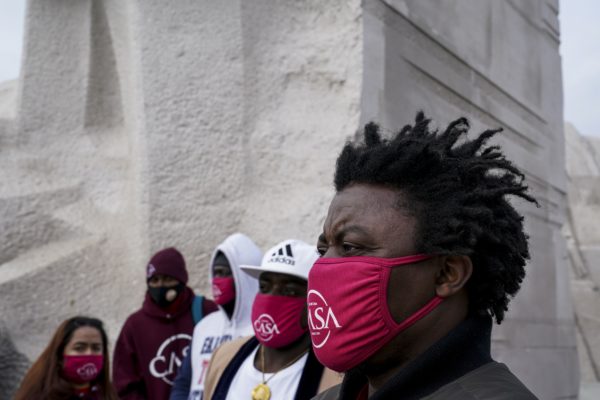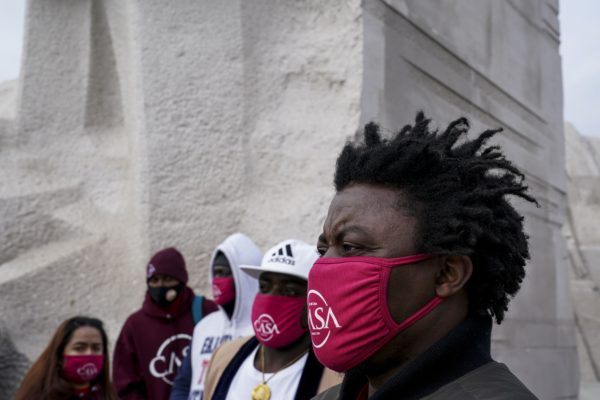‘There Are No Tears For Us’: Black Immigrant Rights Groups Criticize Biden for Inaction on Mass Deportations to Haiti, Jamaica
For the past month, authorities from the U.S. Immigrations and Customs Enforcement have deported hundreds of Black immigrants back to their home countries.
Watchdog activists fighting to ground the deportation flights say ICE has herded over 1,000 asylum seekers, including pregnant women and infants as young as a month old, onto planes destined for Haiti, Jamaica and different African nations.

Advocacy rights groups UndocuBlack and the Haitian Bridge Alliance are calling President Joe Biden’s administration out for its silence. They say the United States continues to boot Black immigrants seeking refuge during a global pandemic and Biden hasn’t stepped up to offer them protections.
“The community is in pain,” Haitian Bridge Alliance co-founder and executive director Guerline Jozef told Atlanta Black Star. “We are literally receiving calls at 5 a.m. of mothers crying.”
An ICE charter plane headed for the Haitian capital city Port-au-Prince left Miami late Monday morning carrying Haitian exiles. It was one of two such deportation flights that hit the skies Monday morning. A private charter plane bound for Morelia, Mexico, took off from San Diego.
ICE has chartered 1,033 flights on private planes since Feb. 3, 2020, according to Jakob Johnston, a Center for Economic and Policy Research analyst who has been tracking deportation flights for the past year. Johnston has tracked 64 such flights from the United States since Joe Biden was sworn in as president Jan. 20. Another seven departed for Guatemala or El Salvador during that period.
The flights have shuttled deportees to 10 different Latin American and Caribbean countries. Haiti has been the final destination for 12 of the flights during that span, more than any country on the list besides Mexico.
“There are no tears for us,” said Patrice Lawrence, co-director of the UndocuBlack Network. “We don’t get empathy. These Black people are presenting for asylum and they don’t get empathy. They don’t get care.”
Deportation flights didn’t slow during the COVID-19 pandemic under former President Donald Trump despite reports that the transports put deported passengers at risk of contracting and spreading the virus in their homelands. Trump also changed policy during the pandemic, using a public health law known as “Title 42” as justification to turn asylum seekers away at the southern border without giving them the opportunity to plead their case for sanctuary. The refugees were returned to their own countries.
Biden released a memo the day of his inauguration ordering a 100-day ban on deportations while his administration conducted an internal overview of the nation’s immigration policies.
But on Jan. 26, Drew Tipton, a Trump-appointed federal judge in the Southern District of Texas, ordered a temporary hold on Biden’s moratorium. That opened the door for expulsions to continue while the details of the deportation embargo get hashed out in court.
Tipton extended his injunction another 14 days earlier this month. It’s scheduled to expire Tuesday, Feb. 23.
Advocates say the deportation efforts have intensified over the past three weeks with immigration officials working to exile as many immigrants as possible before Biden’s respite order takes effect. A large number are Black asylum seekers from Haiti, an impoverished Caribbean nation currently mired in political turmoil.
The nation is raging with uprisings, stemming from a dispute over when President Jovenel Moise’s term is supposed to end. While Moise insists his presidency lasts until February 2022, many Haitians argue it expired Feb. 7 and allege Moise is trying to establish a dictatorship. Demonstrators have taken to the streets for weeks to protests against Moise’s government.
Jozef said Haiti is on a nationwide lockdown. She worried about deported families being dropped into the national crisis and emphasized that immigration is an issue plaguing the entire African diaspora.
“The connection between us all as Black people is not as dividing, being Black immigrants versus African American,” she said. “This is our community, this is who we are as one. And if we do not continue as one, we are all going to perish.”
Advocates said immigrants seeking refuge from African nations like Cameroon, Angola and the Democratic Republic of the Congo have also been targeted for expulsions. They indicate Biden’s moratorium didn’t provide protections to refugees from those countries at the U.S. border.
“They did carve outs that allows them to deport asylum seekers,” Lawrence said of the proposed moratorium. “And the asylum seekers that they’re deporting are Black people, are Haitians. So I can’t rejoice in that.”
But Haitians seem to be on the top of the list. On Jan. 19, U.S. Customs and Border Protection separated Vladimir Fardin, a 9-year-old Haitian boy, from his older brother at the San Francisco International Airport. Customs officials detained the two brothers who were traveling on visas for days, then turned the child over to ICE while his brother was deported to Mexico. Fardin was sent to a government-run shelter.
That same day the brothers were detained, ICE sought to deport Paul Pierrilus, 40, to Haiti despite the fact that he wasn’t born there and had never set foot on the island nation. Legislators were able to get Pierrilus, who moved to the U.S. with his family when he was 5, removed from a deportation flight at the 11th hour in January. But it was to no avail. ICE sent the man to Port-au-Prince on Feb. 2, Newsweek reported.
“We continue to be to be subjected to disdain,” Jozef said. “When Trump came in, he called Haiti in other African nations s–thole countries. … Black immigrants have always been a target, and will continue to be. So what we are seeing now is nothing new.
“The entire system is rooted in racism and anti-Blackness,” she continued. “It is the same system that we have seen from the inception of this country. And Haiti has always been that thing that is unacceptable.”
In their Feb. 8 statement, the Haitian Bridge Alliance and UndocuBlack demanded an end to all the deportation flights. The groups also called for Biden and Vice President Kamala Harris to speak out against the expulsions. They asked that any immigrants who’ve been exiled unjustly be allowed back into the U.S. without any roadblocks.
Yet Biden’s focus through his first few weeks in office has been the nationwide rollout of COVID-19 vaccinations. That’s left ICE to continue with the agency’s mandate.
A Jan. 28 flight that originated from Alexandria, Louisiana, landed in Kingston, Jamaica, with an undetermined number of ousted immigrants on board. Four days later, 102 immigrant passengers were packed aboard a flight to Haiti.
Three deportation flights left for Haiti on Feb. 11. The first two flights had 224 passengers, including five pregnant women and 43 children as young as 4 months old, Jozef and Lawrence claimed.
U.S. Rep. Mondaire Jones (D-New York) announced that the Congressional Black Caucus sent Alejandro Mayorkas, Biden’s Homeland Security Secretary, a letter demanding the mass deportations cease.
“We can’t sit by while ICE blatantly ignores @POTUS’ order & continues to deport planes full of Black people,” Jones tweeted, citing Pierilus’ deportation.

